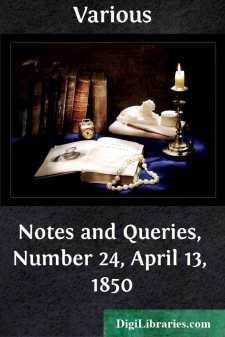Categories
- Antiques & Collectibles 13
- Architecture 36
- Art 48
- Bibles 22
- Biography & Autobiography 813
- Body, Mind & Spirit 142
- Business & Economics 28
- Children's Books 15
- Children's Fiction 12
- Computers 4
- Cooking 94
- Crafts & Hobbies 4
- Drama 346
- Education 46
- Family & Relationships 57
- Fiction 11829
- Games 19
- Gardening 17
- Health & Fitness 34
- History 1377
- House & Home 1
- Humor 147
- Juvenile Fiction 1873
- Juvenile Nonfiction 202
- Language Arts & Disciplines 88
- Law 16
- Literary Collections 686
- Literary Criticism 179
- Mathematics 13
- Medical 41
- Music 40
- Nature 179
- Non-Classifiable 1768
- Performing Arts 7
- Periodicals 1453
- Philosophy 64
- Photography 2
- Poetry 896
- Political Science 203
- Psychology 42
- Reference 154
- Religion 513
- Science 126
- Self-Help 84
- Social Science 81
- Sports & Recreation 34
- Study Aids 3
- Technology & Engineering 59
- Transportation 23
- Travel 463
- True Crime 29
Notes and Queries, Number 24, April 13, 1850
by: Various
Categories:
Description:
Excerpt
SKINNER'S LIFE OF MONK.
Reading for a different purpose in the domestic papers of Charles II.'s reign in the State Paper Office, I came upon a letter from Thomas Skinner, dated Colchester, Jan. 30. 1677, of which I will give you what I have preserved in my notes; and that is all that is of any interest.
It is a letter to the Secretary of State, asking for employment, and recommending himself by what he had done for Monk's memory. He had previously written some account of Monk, and he describes an interview with Lord Bath (the Sir John Grenville of the Restoration); in which his Lordship expressed his approval of the book.
"He [Lord Bath] professed himself so well satisfied, that he was pleased to tell me there were two persons, viz. the King and the Duke of Albemarle, that would find some reason to reflect upon me."
Lord Bath gives Skinner a letter to the Duke of Albemarle (Monk's son), who receives him very kindly, and gives him a handsome present.
"I have since waited on his Grace again, and then he proposed to me (whether upon his own inclination or the suggestion of some about him) to use my poor talent in writing his father's life apart in the universal language; to which end, he would furnish me with all his papers that belonged to his late father and his secretaries. The like favour it pleased my Lord of Bath to offer me from his own papers, some whereof I had a sight of in his study."
Now if any of your readers who are interested in Monk's biography, will refer to the author's and editor's prefaces of Skinner's Life of Monk, edited in 1723, by the Rev. William Webster; and to Lord Wharncliffe's introduction to his Translation of M. Guizot's Essay on Monk, they will see the use of this letter of Skinner's.
1. The life is ascribed to Skinner only on circumstantial evidence, which is certainly strong, but to which this letter of Skinner's is a very important edition. This letter is indeed direct proof, and the first we have, of Skinner's having been employed on a life of Monk, in which he had access to his son's and his relative Lord Bath's papers; and there can be no serious doubt that the life edited by Mr. Webster was a result of his labours.
2. This letter would show that Skinner was not on intimate terms with Monk, nor so closely connected with him as would be implied in Mr. Webster's and Morant's, the historian of Colchester, description of him, that he was a physician to Monk. Else he would not have required Lord Bath's letter of introduction to the son. Lord Wharncliffe has, I have no doubt, hit the mark, when he says that Skinner was probably Monk's Colchester apothecary. Skinner says himself, in his preface, that "he had the honour to know Monk only in the last years of his life."
3. The previous account of Monk, which gained Lord Bath's approval, and led to Monk's son soliciting him to write a life, is probably Skinner's addition of a third part to Bate's Elenchus Motuum, to which he also probably refers in the opening of his Preface to the Life of Monk:—
"I have heretofore published something of a like nature with the following sheets, though in another language, wherein several things, through want of better information, were imperfectly described."
4....












